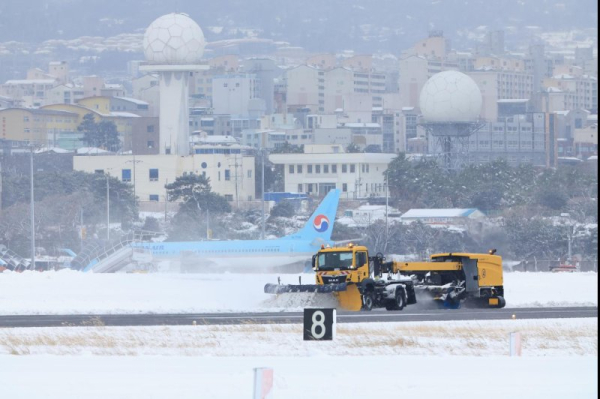
Airport ground crew members remove snow from runways at the international airport in the city of Jeju on South Korea’s largest island of the same name on Friday as heavy snowfall forced the cancellation of many flights. Photo by Yonhap
The season’s strongest cold wave peaked Friday morning, bringing morning lows to below minus-20 degrees C in some Gangwon Province areas, causing traffic and daily life disruptions nationwide and blanketing the southern resort island of Jeju and western coast with heavy snow.
The mercury plummeted to minus-14.7 C in Seoul in the early morning, and many other regions recorded far lower minimum temperatures than the capital, according to the Korea Meteorological Administration. Advertisement
Hwacheon of Gangwon Province, east of Seoul, registered minus-21.5 degrees C, followed by minus-19.2 degrees C in Seocheon of the central province of South Chungcheong, and minus-19 degrees C in Paju, just north of Seoul, the agency noted.
Strong winds with instantaneous speeds of over 55 kph, reinforced the feeling of cold in most regions.
A heavy snow advisory was in effect for Jeju, western coastal areas of South Chungcheong and the southwestern provinces of Jeolla as of 8 a.m.
On Jeju Island, which received more than 30.2 centimeters of snow over the past day, Jeju International Airport completely suspended its runway operations at 8:20 a.m., forcing the cancellations of 137 domestic flights to and from the snow-covered airport as of 11 a.m. Advertisement
Western coastal regions also recorded snowfall of up to 60 centimeters until Friday morning, the KMA said, adding that snow will continue there until early Saturday morning.
More than 200 cases of frozen and broken water meters were reported across the country, including 90 in Seoul, as of 11 a.m., according to the Central Disaster and Safety Countermeasures Headquarters. Six cases of frozen water pipes were also reported in Seoul and the surrounding Gyeonggi Province.
In the Jeolla and South Chungcheong regions, a total of 13 livestock sheds and greenhouses collapsed due to heavy snow.
Heavy snowfall also affected the operation of 46 passenger ships on 38 routes and entry to 91 trails at six national parks, and caused numerous traffic accidents on snowy roads, stranded vehicles and fall-related injuries.